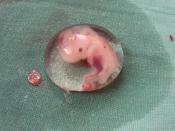Cloning is a topic of much controversy in today's society. Many want it legalized and its scope broadened. In contrast many others including myself say cloning is against human ethics and is extremely dangerous to society. Cloning should be made illegal and the research of cloning should be halted; furthermore cloning information should be retracted from public databases; such as the internet. Cloning should be looked at like it's a nuclear bomb; you don't want to distribute the recipe out to the public at large. In fact, you want to defend the recipe from being obtained by anyone. I will explain cloning, a summarized history, and many of the serious consequences of allowing cloning research to continue. Cloning research itself diminishes all of our existences.
What is cloning? How did it get started? A clone is a genetic copy or a replica of a living organism. One way to make a clone, "as they do in the cattle business, is to split the cells of an early multi-celled embryo which will form two new embryos" (Lawren).
For it to get started into practice it took more than fifty years of questioning and
testing. "The first successful cloning experiment involved a leopard frog. It took place in,
1952 with group of scientist from the Institute for Cancer Research in Philadelphia
(Lawren)". You may not be able to see it at this early starting point; but this is the progression to cloning humans. "Steen Willadsen was the first to clone an artificial chimera. He did this by mixing a sheep and a goat getting the result of a 'geep' (Lawren)". This is a glimpse into the future; once researchers have mastered human cloning then it wouldn't be long before scientists started mixing species. We're no ways close to that level of...



Hey
A little overusage on the sources there, but great essay
1 out of 1 people found this comment useful.